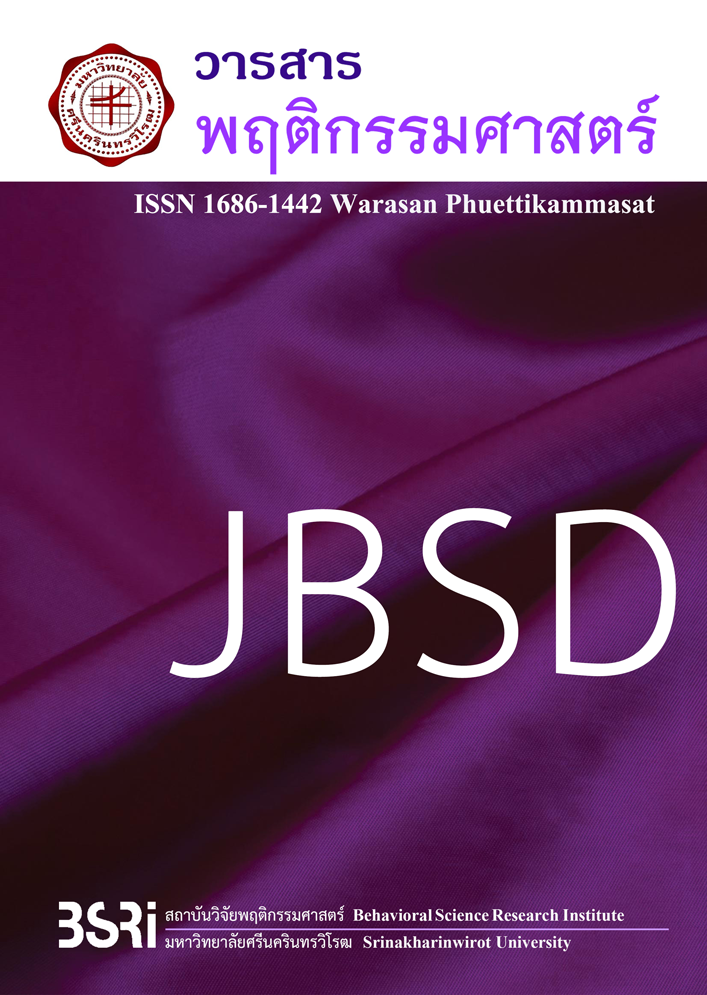Factors correlating with Quality of Life among Thai Elderly: Research Synthesis by Meta-Analysis
Abstract
ปัจจัยด้านจิตสังคมที่เกี่ยวข้องกับคุณภาพชีวิตของผู้สูงอายุ: การสังเคราะห์งานวิจัยด้วยการวิเคราะห์อภิมานThe research synthesis aims toanalyze the contents and study the effect size of the psycho-social factorsthat correlate with quality of life among elderly using the technique ofMeta-analysis. The sample studies were 29 quantitative researches that focusedon the quality of life of elderly. Thecriterion of selection were a) published during 2000-2010, b) searched anddownloaded from ThaiLis database, and c) analyzed and provided statistics suchas by t, z, F or . Content analysis and meta-analysis described by Rosenthal(1984) were the methods used for analysis. Based on the content analysis, the research results revealed thecharacteristics of the researches as follows: a) the majority of researcheswere master’s theses (65.5%), b) most of them were published by Khon KhenUniversity (20.7%), c) they were published in a field of nursing and health(27.6%) and mostly published during 2008-2009 (34.5%), and d) Bangkok and itsperiphery was the area of study (31.0%). In terms of the methodology, it wasfound that a) most of researches were comparative quantitative studies (41.1%),b) the main objective of the studies was to survey and describe the quality oflife (39.3%), c) the sample was selected by multi-stage sampling (34.5%), e) more than half used a questionnaire(58.6%), f) Cronbach Alpha was the reliability test (89.7%), and g) a t-testwas used mainly for analysis (42.9%). Based on the meta-analysis, the findings showed that psycho-social factorscorrelating with the quality of life among elderly can be divided into 5groups, ordered by effect size as follows: program of group guidance (.556),psychological-state factors (.256), situational factors (.235), demographicfactors (.231), and psychological-trait factors (.193), respectively. The primefactors with highest effect size in each group were the group counselingprogram (.932), self-efficacy in good quality of life (.632), family relations(.520), income (.337), and adversity quotient (.420), respectively. Keywords: The research synthesis, Meta-analysis,Quality of life, Elderlyบทคัดย่อการสังเคราะห์งานวิจัยครั้งนี้มีจุดมุ่งหมายเพื่อวิเคราะห์เนื้อหาและศึกษาขนาดอิทธิพลของปัจจัยด้านจิตและสังคมที่เกี่ยวข้องกับคุณภาพชีวิตของผู้สูงอายุโดยใช้การวิเคราะห์อภิมาน กลุ่มตัวอย่างคือ รายงานการวิจัย เชิงปริมาณที่มีประเด็นเกี่ยวกับคุณภาพชีวิตของผู้สูงอายุและมีการวิเคราะห์ข้อมูลด้วยค่าสถิติt, z, F และ ตีพิมพ์เผยแพร่ระหว่างปี พ.ศ. 2543-2553สืบค้นจากฐานข้อมูลออนไลน์ของห้องสมุด ThaiLis และเก็บรวบรวมข้อมูลด้วยแบบบันทึกข้อมูล ซึ่งมีรายงานการวิจัยที่ได้จากการเลือกแบบเจาะจงตามเกณฑ์การคัดเลือกจำนวน29 เรื่อง ใช้การวิเคราะห์เนื้อหาร่วมกับการวิเคราะห์อภิมานตามแนวคิดของโรเซนทาล(1984) ผลการวิเคราะห์เนื้อหาพบว่าคุณลักษณะของงานวิจัยด้านการพิมพ์ ส่วนใหญ่เป็นวิทยานิพนธ์ระดับมหาบัณฑิต (ร้อยละ 65.5) เป็นรายงานวิจัยจากมหาวิทยาลัยขอนแก่น (ร้อยละ 20.7) อยู่ในสาขาวิชาการพยาบาลและสุขภาพ(ร้อยละ 27.6)เผยแพร่ในช่วงปี พ.ศ. 2551-2552(ร้อยละ 34.5) เก็บข้อมูลในกรุงเทพมหานครและปริมณฑล (ร้อยละ 31.0) ส่วนคุณลักษณะด้านระเบียบวิธีวิจัย พบว่า รายงานการวิจัยส่วนใหญ่เป็นการวิจัยเชิงปริมาณแบบเปรียบเทียบ(ร้อยละ 41.1) มีวัตถุประสงค์การวิจัยเพื่อสำรวจหรือบรรยาย(ร้อยละ 39.3) สุ่มตัวอย่างแบบหลายขั้นตอน (ร้อยละ 34.5) ส่วนใหญ่ใช้แบบสอบถาม (ร้อยละ 58.6) มีการตรวจสอบคุณภาพของเครื่องมือด้วยค่าสัมประสิทธิ์แอลฟ่าตามวิธีของครอนบาค (ร้อยละ 89.7) และค่าความเที่ยงตรงเชิงเนื้อหา(ร้อยละ 79.3) และวิเคราะห์ด้วยสถิติทดสอบที (ร้อยละ 42.9) ส่วนผลการวิเคราะห์อภิมานพบว่า กลุ่มปัจจัยด้านจิตและสังคมที่มีอิทธิพลต่อคุณภาพชีวิตของผู้สูงอายุได้แก่ กลุ่มปัจจัยด้านโปรแกรมจัดกระทำ กลุ่มปัจจัยด้านจิตลักษณะตามสถานการณ์กลุ่มปัจจัยด้านสถานการณ์ทางสังคม กลุ่มปัจจัยด้านชีวสังคม และกลุ่มปัจจัยด้านจิตลักษณะเดิมด้วยค่าเฉลี่ยของขนาดอิทธิพลเท่ากับ .556, .256, .235, .231, และ .193 ตามลำดับ โดยมีตัวแปรที่สำคัญในแต่ละกลุ่มปัจจัยที่มีอิทธิพลต่อคุณภาพชีวิตของผู้สูงอายุได้แก่ โปรแกรมการแนะแนวกลุ่ม ความเชื่อในความสามารถตนเองในการมีคุณภาพชีวิตที่ดีความสัมพันธ์ในครอบครัว รายได้ และความสามารถในการเผชิญปัญหาและฝ่าฟันอุปสรรค ซึ่งมีค่าเฉลี่ยของขนาดอิทธิพลเท่ากับ.932, .632, .520, .337, และ .420 ตามลำดับ คำสำคัญ: การสังเคราะห์งานวิจัยการวิเคราะห์อภิมาน คุณภาพชีวิต ผู้สูงอายุDownloads
How to Cite
พึ่งโพธิ์สภ น., & จันประเสริฐ ฐ. (2014). Factors correlating with Quality of Life among Thai Elderly: Research Synthesis by Meta-Analysis. The Periodical of Behavioral Science, 20(1). Retrieved from https://so06.tci-thaijo.org/index.php/BSRI/article/view/15839
Issue
Section
Research Article
License
Behavioral Science Research Institute, SWU
114 Sukhumvit 23, Bangkok 10110, Thailand.
Tel.02-649-5000 # 17600


